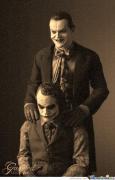I thought I posted about this already, but for some reason can't find the post, BUT,
I am curious, I understand it to be pretty complicated. The scoring. I shoot minor 9mm, if that makes a difference.
Is it better take your time and get more alphas/ fewer charlies, but have a worse time, or is it better to speed through it and have maybe a few more charlies, but a fast time.
How important is it to take a 3rd shot to get rid of a charlie.
Thanks!



 Reply With Quote
Reply With Quote




